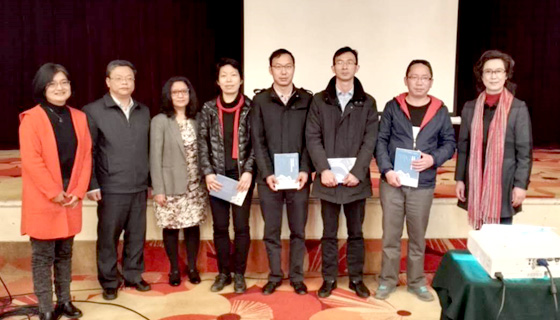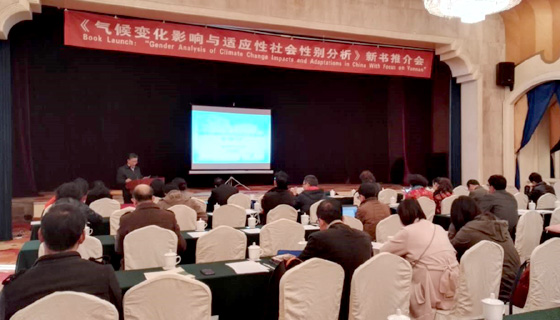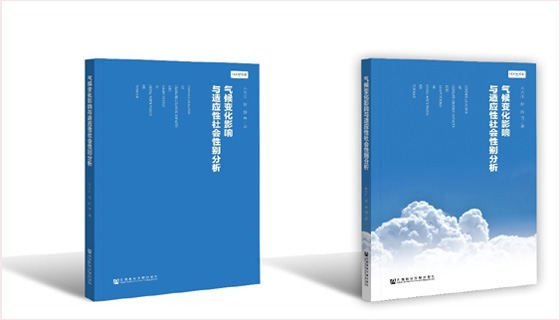This site uses cookies, as explained in our terms of use. If you consent, please close this message and continue to use this site.
 Panel members during the inauguration of the book
Photo Credit: Jun Jun Zhou/ICIMOD
Panel members during the inauguration of the book
Photo Credit: Jun Jun Zhou/ICIMOD
Last month, ICIMOD and the Yunnan Academy of Social Sciences (YASS) hosted a book launch for a co-produced volume entitled, Gender Analysis of Climate Change Impacts and Adaptation in China with Focus on Yunnan. More than 30 representatives from provincial government offices, universities, and institutions were on hand to receive long-awaited text.
Gender Analysis, written in Chinese, synthesizes major results from six years of research in China, carried out by ICIMOD and its partners in the Himalayan Climate Change Adaptation Programme (HICAP) which is supported by the Governments of Norway and Sweden.
Under HICAP, a substantial part of the research in China focuses on gender issues in climate change adaptation, a topic on which there has previously been little research in the Chinese context. The book presents a comprehensive framework for analyzing climate change impacts and policies from a gender perspective in the context of a record-breaking and persistent meteorological drought with widespread impacts on millions of people, livestock, and crops in Yunnan. A rich range of case studies highlight the actual and potential effects of climate change, particularly water stress on women’s vulnerabilities.
In his welcome remarks, Wang Wencheng, Deputy Dean of YASS, praised the YASS–ICIMOD partnership and their accomplishments over the last six years. He said he hoped the two parties would continue further cooperation in the near future.
Sun Dajiang, researcher with Women and Development Center (WAD) at YASS, and one of the main authors of the book, provided an introduction to the audience. She noted that compared to men, women are affected more by climate change, and more vulnerable to climate change impacts as women rely more on natural resources for their livelihoods. She added that decision makers must take gender sensitive approaches when drafting policies on climate change and adaptation, and should be careful to include capacity building of women in policy frameworks that address climate change and adaptation.
Suman Bisht, Programme Coordinator of AdaptHimal and a Senior Gender Specialist at ICIMOD, presented a brief introduction on ICIMOD and HICAP. She emphasized the significance of research in the Hindu Kush Himalaya (HKH) for designing effective plans for improved adaptation to climate change.
Professor Zhao Qun, the director of WAD, presented on nine policy recommendations that are also included in the book. She stressed that these policy recommendations could help enhance the government’s adaptive capacity and strengthen the social gender sensitivity when coping with climate change.

The nine recommendations included in the publication are as follows:
In his closing remarks, Mr Wang pointed out that gendered differences in climate change impacts and adaptive capacity mainly relate to men and women’s different social roles. He further added that we need to provide special attention and respect to gender difference in the context of climate change in order to build a harmonious society and achieve equal rights between men and women. In addition, Wang stated that the research results of this book lay the foundation for exploring mechanisms to transform knowledge production into practical measures at the local community level.
Participants concluded the event by contributing to a plenary discussion on how to enhance the collaboration between the national government and institutions at county, township and community levels to cope with climate change. They suggested policy actions the government could take to help mountain farmers, especially women, better adapt to climate change.
The Social Sciences Academic Press in China published the book. It will be made available to relevant government agencies, research institutions, universities, individual researchers and libraries.

This book analyses the impacts of climate change on rural livelihoods through a gender lens. The conceptual framework for the book focuses on four elements of the linkage between gender and climate change in the context of rural livelihoods: gender impact of climate-induced resource shortage like water, and ecosystem services; gender impact of climate-induced migration; gender dimension of natural disasters and gender, poverty and climate change. The research is based on case studies in Yunnan looking at gendered vulnerability and adaptation to climate change and providing evidence and knowledge related to gender and climate change for policy makers. Three relevant analytical frameworks have been applied including Caroline Moser’s gender role analysis framework, the framework for gender-aware vulnerability analysis and gender specific adaptation approach. Gender vulnerability in accessing livelihood related resources such as land, water, credit, agricultural technology, extension and training services have been examined, particular women’s vulnerability. The different adaptation needs and skills of women and men have been discussed with a special focus on women.
Each chapter has a title and abstract in English for non-Chinese readers. Each chapter follows a consistent structure, namely context introduction, research methodology, research findings and policy recommendation.
Stay up to date on what’s happening around the HKH with our most recent publications and find out how you can help by subscribing to our mailing list.
Sign Up